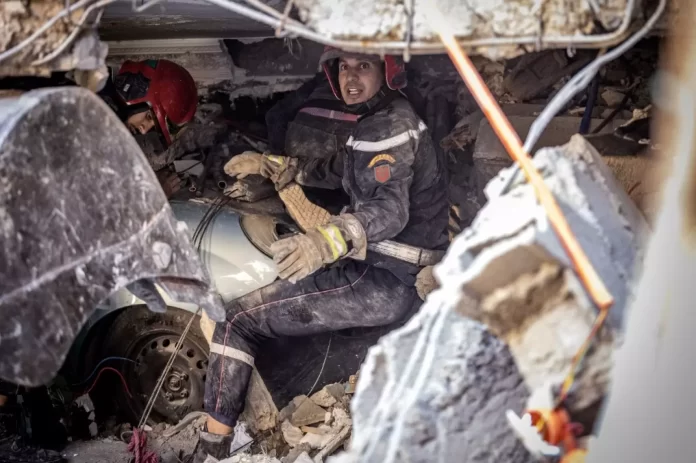MARRAKESH, Morocco, Sep 10: Morocco’s deadliest earthquake in decades has killed at least 2,012 people, authorities said on Saturday, as troops and emergency services scrambled to reach remote mountain villages where casualties are still feared trapped, reports Middle East Eye.
After a meeting chaired by King Mohammed VI, the palace announced three days of national mourning, with flags to fly at half-mast on all public buildings. But the Red Cross warned that it could take years to repair the damage.
The 6.8-magnitude quake struck late on Friday in a mountainous area 72km southwest of the city of Marrakesh, the US Geological Survey reported. Tremors were felt as far away as Huelva and Jaen in southern Spain. The World Health Organisation said more than 300,000 people were affected in Marrakesh and surrounding areas.
Civil defence Colonel Hicham Choukri, who is heading relief operations told state television earlier the epicentre and strength of the earthquake created “an exceptional emergency situation”.
With strong tremors also felt in the coastal cities of Rabat, Casablanca and Essaouira, the quake caused widespread damage and sent terrified residents and tourists scrambling to safety in the middle of the night.
In the mountain village of Tafeghaghte, near the quake’s epicentre, virtually no buildings were left standing. The traditional clay bricks used by the region’s Berber inhabitants proved no match for the rare quake.
In the late afternoon, soldiers continued to search through debris, but most survivors headed to the cemetery where some 70 villagers were laid to rest. It was the strongest-ever quake to hit the North African kingdom, and one expert described it as the region’s “biggest in more than 120 years”.
Updated interior ministry figures on Saturday showed the quake killed at least 2,012 people, the vast majority in al-Haouz, the epicentre, and Taroudant provinces. Another 2,059 people were injured, including 1,404 in a critical condition, the ministry said.
Nearly all the houses in the area of Asni, some 40km south of Marrakesh, were damaged, and villagers were preparing to spend the night outside. Food was in short supply as roofs had collapsed on kitchens, said villager Mohamed Ouhammo.
The village of Tansghart in the Ansi area, on the side of a valley where the road from Marrakesh rises up into the High Atlas, was badly hit, according to Reuters.
The Royal Moroccan Football Federation announced that a Cup of African Nations qualifier against Liberia, due to have been played on Saturday in the coastal city of Agadir, had been postponed indefinitely.
Significant damage likely
The USGS PAGER system, which provides preliminary assessments on the impact of earthquakes, issued a “red alert” for economic losses, saying extensive damage is probable.
The Red Cross said it was mobilising resources to support the Moroccan Red Crescent, but its Middle East and North Africa director, Hossam Elsharkawi, warned: “We are looking at many months if not years of response.”
Turkish solidarity
Turkish President Recep Tayyip Erdogan took to X, formally known as Twitter, to show solidarity with the “Moroccan brothers”.
“We will support our Moroccan brothers in every way in this difficult hour,” Erdogan said.
Turkey’s AFAD disaster management authority said 265 aid workers from AFAD, the Turkish Red Crescent and other Turkish NGOs were ready to travel to the earthquake region in case Morocco called for international assistance. It also said that Turkey was ready to deliver 1,000 tents to the affected areas.
In 2004, at least 628 people were killed and 926 injured when a quake hit Al Hoceima in northeastern Morocco, and in 1960 a magnitude 6.7 quake in Agadir killed more than 12,000.
The 7.3-magnitude El Asnam earthquake in Algeria killed 2,500 people and left at least 300,000 homeless in 1980.




